
- About
- Get involved
- Updates
- Resources
- MyData Declaration
- Declaration in English
- Declaration in Catalan
- Declaration in Chinese (traditional, Hong Kong)
- Declaration in Chinese (traditional, Taiwan)
- Declaration in Chinese (simplified)
- Declaration in French
- Declaration in German
- Declaration in Greek
- Declaration in Hungarian
- Declaration in Italian
- Declaration in Japanese
- Declaration in Korean
- Declaration in Slovakian
- Declaration in Slovenian
- Declaration in Spanish
- Declaration in Swedish
- Case Library
- Webinars
- White papers
- MyData Operators
- Future of Work & Skills
- MyData4Pandemics – learning from COVID-19
- State of MyData 2021
- Community Resources
- Style Guide
- MyData Declaration
- Events
- Contact us
Strategy
MyData Global Strategy 2020-2022
The association general meeting approved this strategy on June 16th 2020, and revised it on May 6th 2021.
MyData Global Association (hereafter MyData Global) is an international nonprofit established in October 2018. It operates globally to empower individuals by improving their right to self-determination regarding their personal data, as defined in MyData Declaration and the bylaws of the association. MyData Global and its international network operate based on trust, which is actively built by the six guiding principles, an essential part of our culture. MyData Global strives to weave these principles into all our interactions. The ‘Global’ in our name commits us to seek the diversity of viewpoints to truly tackle global challenges. The ‘human’ in ‘human-centric’ does not discriminate: MyData is equally for all people.
As of June 2020, MyData Global has nearly 100 organisation members and 400 individual members from over 50 countries on six continents. MyData Global also facilitates the strong MyData community with more than 2000 participants working on the ethical use of personal data. This is the first Strategy for the new organisation, which was developed during 2019 and finalised in early 2020.
MyData Global’s key strategic goal for the period 2020-2022 is to accelerate practical advances towards the three shifts of the MyData declaration by developing the skills, knowledge and connections of people in the MyData community and more widely in the digital services industry and ecosystems.
The summary MyData Global’s strategy, depicted on the next page, has four elements that create the basis of our strategy:
1. Purpose and Vision — The Change We Want To See
2. Impact Areas — What We Do
3. Brand and Organisation — The Engine
4. Our Theory of Change — Connecting Vision to Action
In terms of actions and objectives, the lower part of our Theory of Change corresponds to the strategy term 2020-2022.
Over the course of creating this strategy, our organisational understanding has evolved, and this has led us to make 5. Strategic decisions for the term 2020-2022 and also to define 6. What we won’t do 2020-2022.
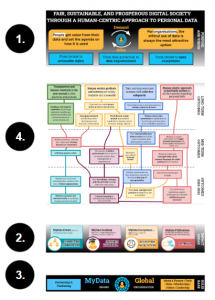
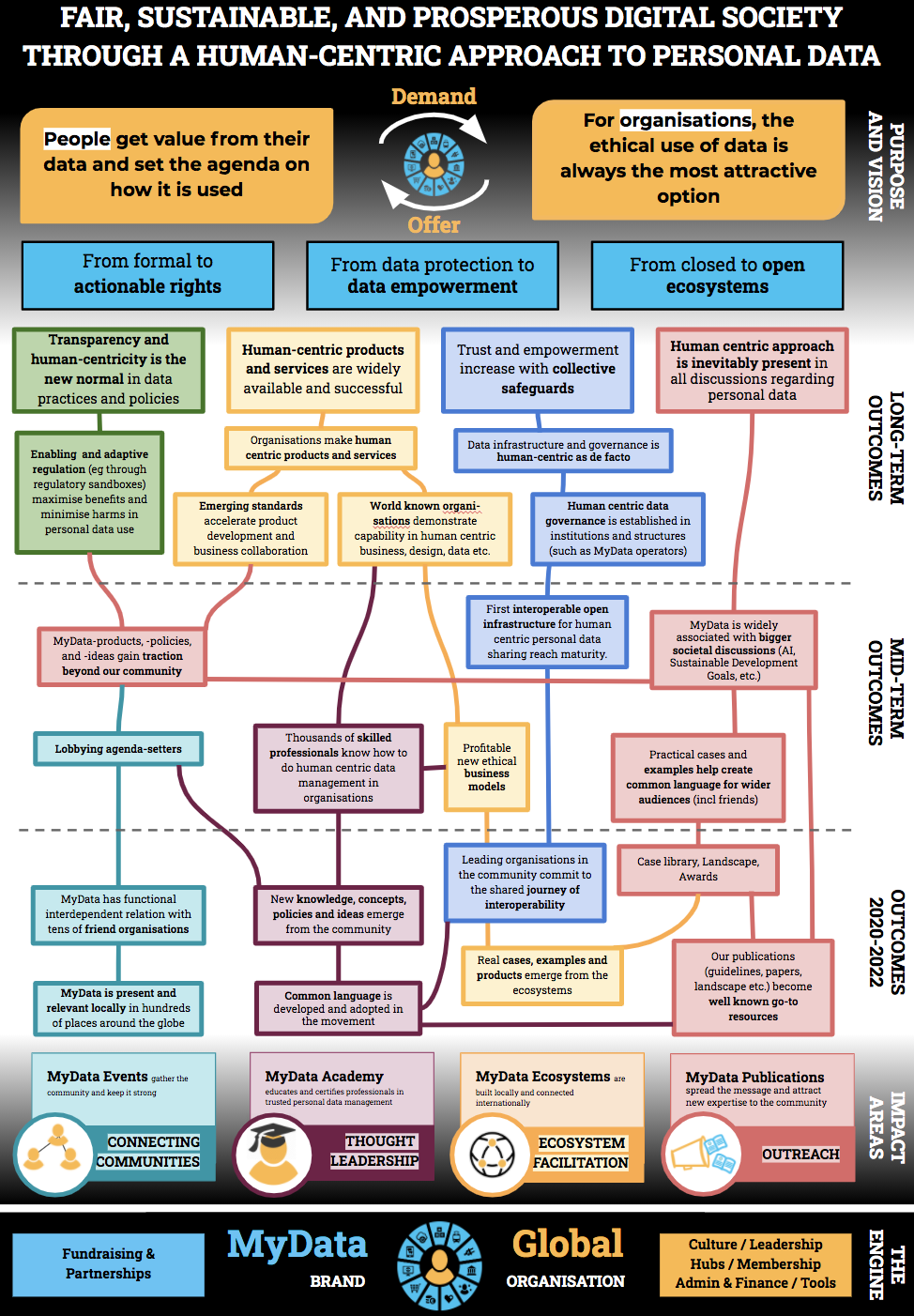
Download the full image in PDF or make a copy of the editable version.
1. Purpose and Vision — The Change We Want To See
MyData is a human-centric and ethical approach to personal data which aims at a fair, sustainable, and prosperous digital society for all. In this society, people get value from their data and set the agenda on how their data is used. In this society, the ethical use of personal data is always the most attractive course of action for organisations.

To make this vision a reality, we believe three major shifts need to take place. These shifts were first described in 2017, when the MyData community co-created the MyData Declaration, underlining the need for human-centricity and agency of people and communities in the data economy.
To realise the MyData vision, we need the shifts …
From Formal to Actionable Rights: People should be able to effortlessly, seamlessly, and instantaneously exercise their digital rights when using digital services – meaning our formal rights become “one-click rights”.
From Data Protection to Data Empowerment: People should not be treated as merely “subjects who need to be protected”, but rather autonomous human beings with the will, agency, opportunities, skills, and tools to make use of personal data – as they like.
From Closed to Open Ecosystems: There exists a level playing field and fair competition among all sizes of companies, which will replace current virtual monopolies and produce real choices between good alternative products and services for people.
We use the slogan ‘Make It Happen, Make It Right’ to constantly remind us about the balance we seek between creating and being cautious about the consequences. The future practices around personal data management should become sustainable from a business perspective and distinctively different and better from the current data economy (make it happen). At the same time, they should be sustainable from societal and individual perspectives (make it right).
We will continually add clarity to the next steps needed to reach our vision and the message about what MyData Global stands for.
2. Impact Areas — What We Do

We’re known for connecting communities through organising vibrant and action-oriented, multi-stakeholder meetings and facilitating online interactions. Events are significant for the cohesion and engagement of any community. The success of our global conferences and other events has established MyData as a warm, welcoming, and close community. In the post-COVID world, we will continue organising globally accessible online events and hybrid conferences that let us tap into the long-needed direct human interaction and connection. The unique strategic contribution of MyData Events is to provide opportunities for interactive meetings, which are crucial for community cohesion and wellbeing.
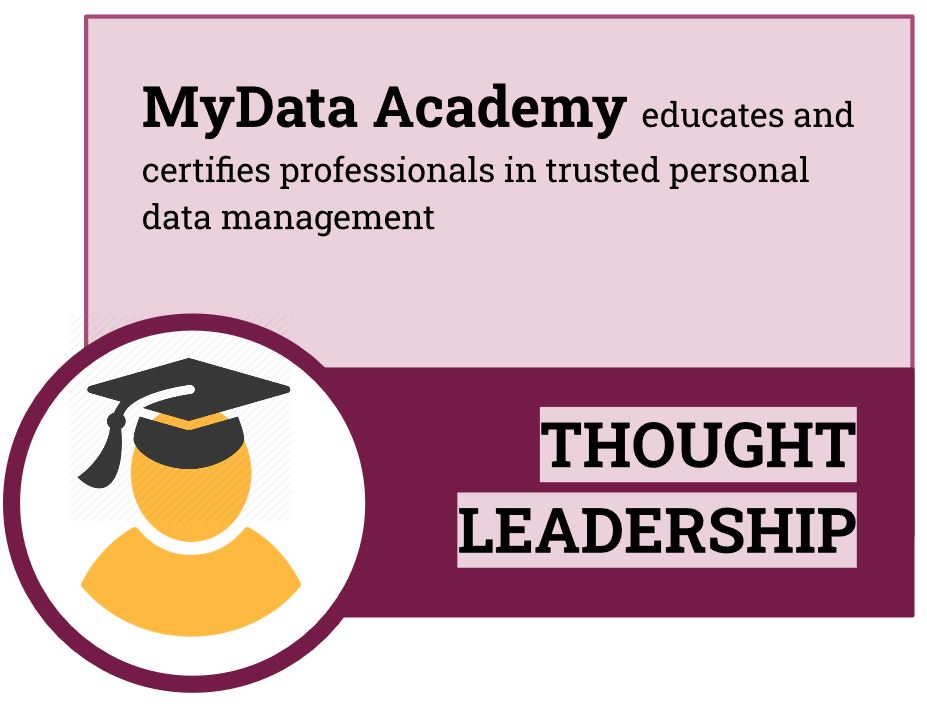
Our thought leadership is what centres us. It is the magnet that pulls in and our true north. The unique contribution of thought leadership is developing common language and creating new knowledge, concepts, policies, and ideas. This means collective sensemaking of the different relevant technologies, concepts and principles and what those mean in particular cultural, political and societal contexts. Our thought leadership spearheads the way to innovation in the personal data space, both theoretically and practically. A key initiative in the long-term is to establish the MyData Academy training and certification programme as a sustainable and impact-driven source of revenue as well as a vehicle for collecting, synthesising, developing, and disseminating the expertise and thought leadership in the MyData community.
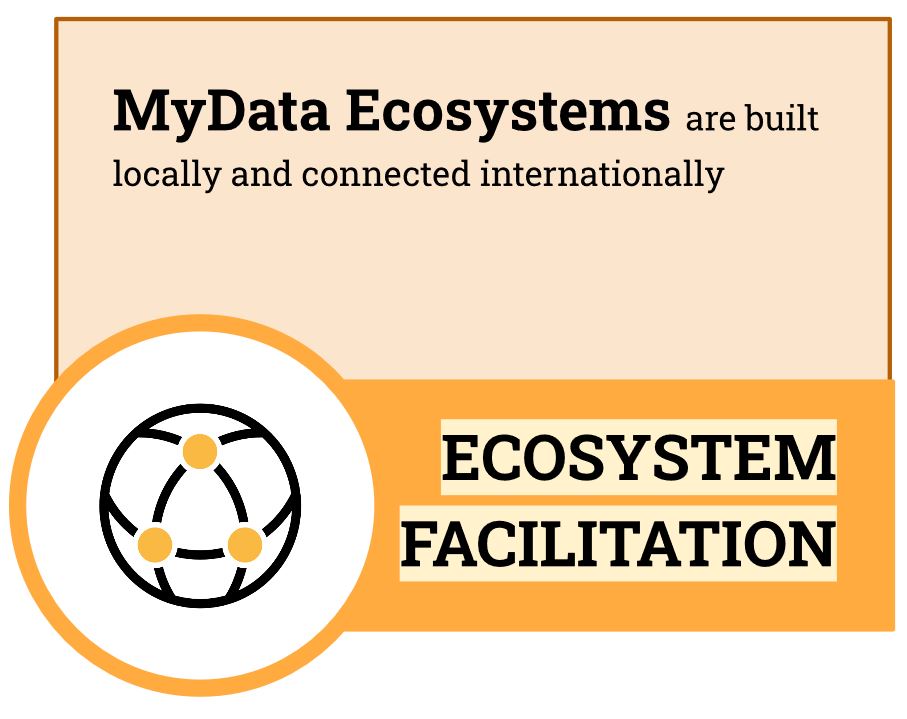
By Ecosystem facilitation, we refer to bridging the people and organisations that are developing and providing MyData services and enabling solutions in practice or willing to build them. The aim of facilitating the development of MyData Ecosystems is to increase the speed of co-development and co-learning and at the same time find a common direction on a journey towards interoperability.

Outreach means the planned activities to reach and engage with our stakeholders, with the intent to spread our core messages, promote practical examples and doers in our community, and amplify our organisational presence. The key activity in this area is the continued production and promotion of MyData Publications, such as white papers, expert webinars, a library of case studies, which will become respected, go-to resources for the personal data community. Effective outreach will also produce a measurable change in the reach, reputation and level of activity of MyData Global.
3. Brand and Organisation — The Engine
MyData Global Organisation and the MyData Brand, together form the engine that supports the four impact areas: Connecting Communities, Thought Leadership, Ecosystem Facilitation, and Outreach.

The financial stability of MyData Global is ensured through our core funding: a base of unrestricted funds which are predictable over a multi-year period. Core funding is used for sustaining the engine of the organisation. The work in impact areas will be self-funded through revenue-based financing when possible and also supported by external funding. Surplus from impact activities is unrestricted funding and is allocated according to the organisation’s strategic priorities.
The MyData brand is a core asset of MyData Global. It is about communicating MyData’s vision for a fair, sustainable, and prosperous digital society. Our audience’s perceptions about the MyData brand are formed by communicating our impact to progress towards our vision. The MyData brand should feel valuable to members, and its use is protected with a trademark and other IPR mechanisms.
Human resources. Talented and motivated staff and volunteers keep the engine running. MyData Global is a good, attractive employer. During the strategy period, the team will be expanded for growth (up to 8 full-time members) with increasing diversity. The well-being of the staff radiates to the whole community.
Fundraising within the organisation is coordinated by MyData Global staff. The efforts, expertise, and contacts of Hubs and the community are integrated into the process. Our fundraising principles are independence (no compromise on decision-making, alignment with strategy), neutrality (freedom also to criticise our funders, non-exclusivity) and transparency (funding sources are public and spending open by default).
Partnerships. We build functional interdependent relationships with dozens of friend organisations. As examples, we influence standards but don’t lead standards making. Our friend organisations might interface with the general public; we don’t.
Culture. Building on the guiding principles, the MyData Global organisation and community’s culture is a critical defining factor of the brand and experience. Culture is valued and developed constantly.
Membership. The growth of our impact relies on our proud members all around the world. We articulate, communicate and develop the value both for individual and organisational members and stay accountable to fulfil our purpose.
Local hubs. While MyData Global operates globally, it is grounded on local, regional, and national level through the local hubs. Hubs represent members of MyData Global locally and provide them with a structure to promote the MyData vision. MyData Global and local hubs are highly aligned in their purpose while loosely coupled in their activities. This means that the Local Hubs are committed to following the MyData Declaration, Bylaws and guiding principles but can plan and run their activities independently.
Thematic groups. As opposed to geographically bound local hubs, thematic groups unite actors working on similar topics globally. They are the engines for the development and dissemination of MyData thought leadership in their specific domains while also contributing to other impact areas such as outreach through the production of MyData Publications.
Admin and finance. We develop efficient processes in line with our guiding principles. We can understand our short- and long-term finances and know what investments bring value and strong financial growth.
Tools. We use efficient and collaborative tools and processes. We seek tools and best practices that are in line with the MyData principles where possible.
4. Our Theory of Change — Connecting Vision and Action
A Theory of Change is a comprehensive description of how and why the desired change (our Purpose and Vision) is expected to happen. It is focused on mapping out the ‘missing middle’ between what an initiative does (our Impact Areas) and how these lead to the desired goals being achieved. Theory of Change explains the process of change (impact) by outlining causal linkages, i.e., its short-term, intermediate, and longer-term outcomes.
As we have limited resources and limitless ambition, the Theory of Change helps us make more informed decisions about strategy and tactics now and in the future. For example, it is an essential tool for determining ideal partnerships, prioritising activities or setting goals. When we implement projects, they will be aligned to the Theory of Change. Similarly, Hubs and Thematic Groups are encouraged to align with outcomes within our Theory of Change.
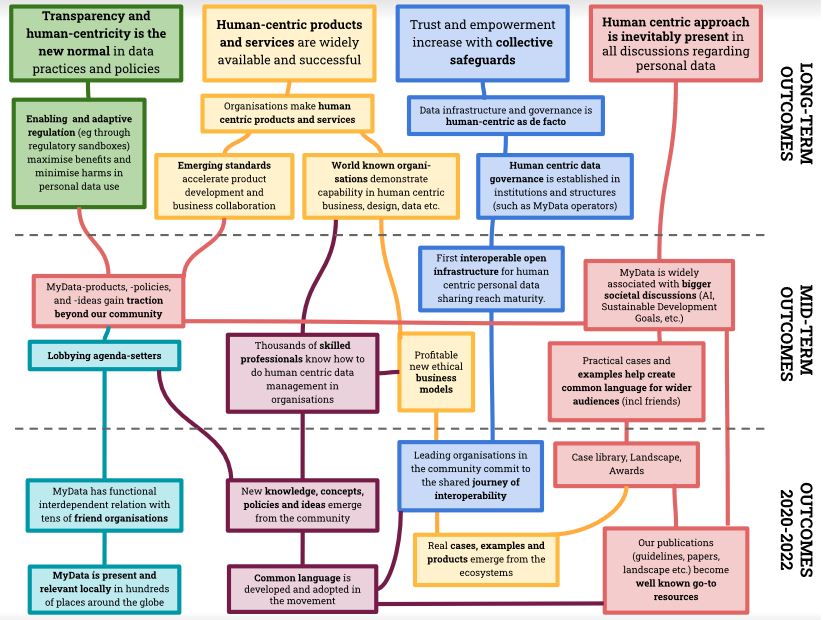
5. Strategic decisions
Some of the existing structures and forms of working may not be fully aligned with the new strategic thinking. Below are strategic decisions for the term 2020-2022 to make this alignment.
Financial self-sustainability for the core activities based on membership fees: We build our finances to sustain the organisational core activities (see Brand and Organisation — the Engine) with the membership fees by the end of 2022. Once we meet the self-sustainability objective, external funding (grants, projects, donations) will be sought and used only to scale our work on the four impact areas.
MyData Global, hubs and thematic groups organise activities towards common goals: We use the term ‘MyData Organisation’ to refer to the MyData Global association and Hubs and Thematic Groups, which all have a formal connection to the association.
Thematic groups are separated from hubs: Thematic groups are output-oriented, and their work is part of the thought leadership impact area.
Simple membership policy: To ensure accountability, we will harmonise the relationship between Hubs, members, and MyData Global. There is only one membership for MyData, and that is the membership of MyData Global. In practice, this means that if a Legal Entity Hub (a hub that has formed into a legal entity) has members, they must also be members of MyData Global.
Four impact areas and two main products: As of now, the impact strategy of MyData Global is around four impact areas: Connecting Communities, Thought Leadership, Ecosystem Facilitation, and Outreach AND two related ‘main products’ the MyData Events and MyData Academy. MyData Events is already mature and will be separated into its own legal entity during the strategy term, while MyData Academy is incubated during the strategy term.
Separating MyData Events to another legal entity: Prepare founding of “MyData Events and Services Ltd” as a 100%-owned company of MyData Global ry, for revenue-generating services (now Events, later, e.g. Academy).
6. What we won’t do 2020-2022
We built our Theory of Change by focusing our short- and medium-term strategy on our core strengths and unique contributions. This meant that some tough decisions were made regarding what we were not going to do – for example, because someone else is already doing exemplary work in those particular areas.
What we don’t do
- Legal action (e.g. strategic litigation, class suits) or legal advice: Our key goal is building skills and collaboration. We don’t have the skills, staff, or history of this.
- Commercial consultancy services for individual businesses: Our members do this business. We serve the broader ecosystem, not individual businesses.
- Act as a funder or funding intermediary (e.g. European Commission projects): We are not mature enough, and administration and distribution of finances are not our key competencies.
- Lead implementations of large projects (e.g. Horizon 2020): We are not mature enough and don’t want to become too bottlenecked with resources. We will, however, be available as a project partner.
- Consumer or market research: Such activities are not our core competence, and they are done via partners (Sitra, Gartner, etc.).
- Make commercial MyData software products of services: Our members do this. It is conceivable MyData Global may be home to open-source projects.
- Lead standardisation efforts: There are enough standardisation bodies already. We DO develop requirements for standards, and we expect to contribute but not lead.
Things we are not planning to do extensively in the short term but which we are not ruling out in the long term
- Campaigns or education aimed at citizens in masses: Our main target groups are more professionals and “active citizens”. We leave this mainly to “friend organisations” or others.
- Extensive direct international lobbying. Our lobbying capability is limited in scope, and we focus mainly on the European regulatory initiatives such as the Data Governance Act and Data Act.
However, Hubs and Thematic Groups are encouraged to do public-facing activities and advocacy work within their scope.